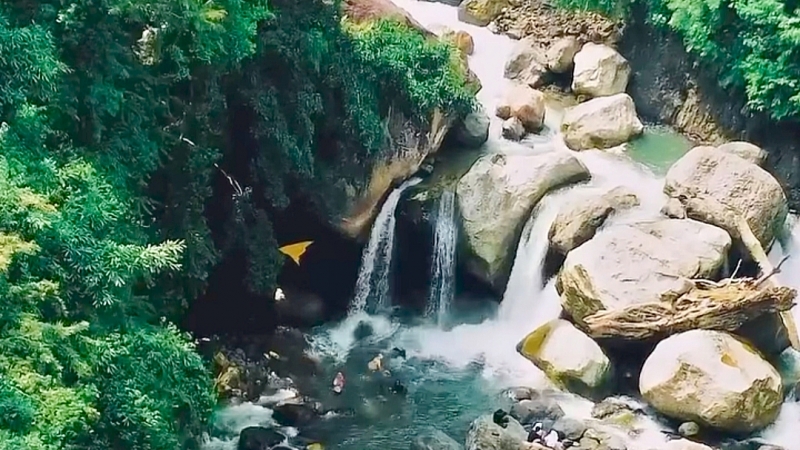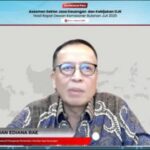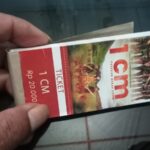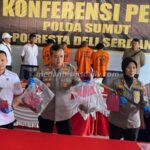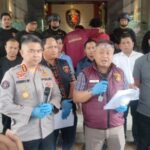During the leadership of North Sumatra Governor Bobby Nasution, the people strongly desire more advanced development for South Tapanuli (Tabagsel).
However, according to a Tabagsel youth figure, the community is actually anxious because they feel there is minimal development attention from the North Sumatra Provincial Government.
Therefore, it is time for Tabagsel to separate from North Sumatra because they want to become an independent province with prosperous and thriving people.
Tabagsel has incredible natural resource potential, such as gold mines in Mandailing Natal, geothermal power plants, extensive palm oil plantations, hydropower potential, and a long coastline.
Not only that, Tabagsel also holds world heritage in the form of biodiversity, including the habitat of the Sumatran Tiger and Tapanuli Orangutan in Batang Toru, as well as the Batang Gadis National Park conservation area.
“Tabagsel is very rich. Taxes from our region flow to the central and provincial governments, but what returns to the people is poverty, lagging education, inadequate hospitals, and severely damaged roads. So it’s natural for us to think that Tabagsel should stand alone as a province,” he emphasized.
He gave an example: the existence of BB license plates used in Tabagsel seems to be historical evidence that since the Dutch colonial era, the Tabagsel region was indeed separated from North Sumatra.
“If Langkat has many BL (Aceh) vehicles, Palas and Labusel have many BM (Riau) vehicles, and Mandailing has many BA (West Sumatra) vehicles, that’s normal. But strangely, the BB plates, which are originally from Tabagsel, are often not recognized,” he said.
The disappointment of the Tabagsel community peaked after the failure of road construction in Sipiongot, which was dragged into a legal case. This highly anticipated strategic project was abandoned due to alleged corruption.
“This is clear proof that Tabagsel is not a priority. Even vital roads can fail because of individuals’ actions, while our people continue to suffer,” he added.
He emphasized that the idea of Tabagsel becoming its own province is not merely an emotional issue, but a real aspiration from the community who are fed up with development injustice.
“If the provincial government continues to ignore us, it’s better for Tabagsel to determine its own fate. We lack neither social capital nor resources to be independent,” he said.
He also mentioned public services that are far behind compared to neighboring provinces.
“Samsat services in Riau or West Sumatra are much better. It’s ironic that we, who are rich, are made poor in our own home,” he criticized.
In his closing statement, he invited all elements of the Tabagsel community to unite in fighting for development justice. “If North Sumatra is incapable of managing Tabagsel, let us manage ourselves. Tabagsel must be independent,” he concluded.
Sigitan
I am unable to find any significant historical, cultural, or geographical information about a place named “Sigitan.” It is possible that the name may be misspelled, refers to a very localized site, or is from a fictional source. If you have more context, I would be happy to try another search.
Sipiongot
I am unable to provide a summary for “Sipiongot” as I do not have any information about this place or cultural site in my knowledge base. It is possible that the name is misspelled, highly localized, or refers to a very recent or lesser-known location. To find accurate information, you may need to consult local resources or official cultural heritage databases.
North Padang Lawas
North Padang Lawas is a regency in North Sumatra, Indonesia, known for its significant archaeological heritage from the ancient Batak kingdoms. The area is famed for its Hindu-Buddhist temple complexes, such as the Bahal temples, which date back to the 11th-13th centuries. These historical sites reflect the region’s importance as a center of trade and religion before the widespread adoption of Islam in the area.
Mandailing Natal
Mandailing Natal is a regency in North Sumatra, Indonesia, historically known as a significant cultural heartland for the Mandailing people. It was once a powerful federation of kingdoms and is renowned for its traditional music, intricate woven textiles (ulos), and its historical connection to the production of high-quality Arabica coffee. The region’s history was also significantly shaped by the Padri War in the early 19th century.
Batang Toru
Batang Toru is a tropical rainforest ecosystem located in North Sumatra, Indonesia. It is a critical habitat for the Tapanuli orangutan, the world’s most endangered great ape, which was only identified as a distinct species in 2017. The area’s history is marked by its role as a last refuge for this species, which is threatened by habitat loss and fragmentation.
Batang Gadis National Park
Batang Gadis National Park is a protected area located in North Sumatra, Indonesia, established in 2004. Its creation was largely driven by the local community’s desire to protect the region’s watershed and biodiversity following a significant earthquake. The park is part of the Bukit Barisan mountain range and serves as a vital habitat for endangered species like the Sumatran tiger and tapir.
Langkat
Langkat is a regency in North Sumatra, Indonesia, historically known as the seat of the Langkat Sultanate. Its most significant cultural site is the Azizi Mosque, built in 1902, which stands as a landmark of the region’s Islamic heritage and the sultanate’s historical influence. The area was also a major producer of oil and rubber during the colonial era.
Palas
I am unable to provide a specific summary for “Palas” as it is an ambiguous term. It could refer to the Palas in Cardiff Castle, a Victorian Gothic revival building constructed in the 19th century. Alternatively, it might refer to Palaš, a historic cultural restaurant in Zagreb, or to various other places or buildings sharing that name.

